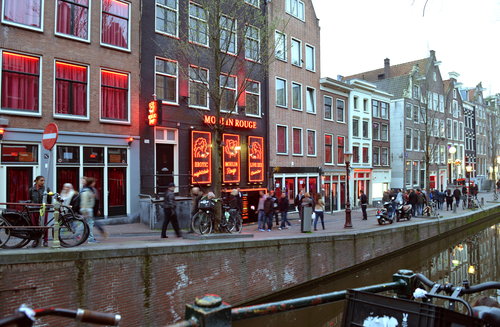Registration of sex workers breaches right to privacy, says court

Compulsory registration of sex workers by local councils in order to regulate prostitution breaches privacy rules, Trouw reported on Friday.
The decision to ban the registration equirement some local councils impose on prostitutes was taken recently in two separate rulings by privacy watchdog Autoriteit Persoonsgegevens (AP) and a ruling by the Amsterdam administrative court on Wednesday.
Registration means that sensitive data, such as information on the person’s health, criminal past and ethnicity are recorded and this is against the law, even if it is done under the guise of combating exploitation and human trafficking, Trouw writes.
In the Amsterdam case, brought by brothel owners against the local council, the judge decided that holding on to the information given by sex workers during the obligatory interview with the owner of the premises may not be kept and shared with the local council for the purpose of checking up on the sex workers.
The AP decided that The Hague local council is also in breach of the privacy law by registering sensitive information. There is no legal ground for this, the AP said. But in practice prostitutes were forced to register, according to sex workers’ union Proud.
In a press release, the Haagse Stadspartij said the council has yet to answer questions about why it circumvented privacy rules, what sort of information has been gathered and what the consequences were of sex workers refusing to submit to ‘an interview’.
‘We support the fight against abuse of sex workers but that doesn’t mean their rights can be compromised. Like all other citizens of The Hague they have a right to privacy,’ Haagse Stadspartij spokesperson Fatima Faid said.
The AP also made short shrift of Utrecht local council’s plans to not only introduce compulsory registration but also to allow the authorities to gather information about sex workers without their knowledge, for instance by monitoring prostitution zones.
Humiliating
Registration is a moot point with prostitutes, who, according to Proud, feel uncomfortable to be in a database and experience the personal questions about their sexual and medical history as humiliating, the paper writes.
An earlier attempt to create a national database to get a handle on prostitution have also floundered for privacy reasons.
But according to Utrecht local council, which has said it will fight the AP’s decision, there is a difference between the national and the local council database. The aim of the national database was to allow punters to check whether they were dealing with legal prostitution. Utrecht says it is focusing on the well-being of the sex workers themselves.
According to mayor Jan van Zanen registration could be one of the main weapons against human trafficking, the paper said.
Thank you for donating to DutchNews.nl.
We could not provide the Dutch News service, and keep it free of charge, without the generous support of our readers. Your donations allow us to report on issues you tell us matter, and provide you with a summary of the most important Dutch news each day.
Make a donation